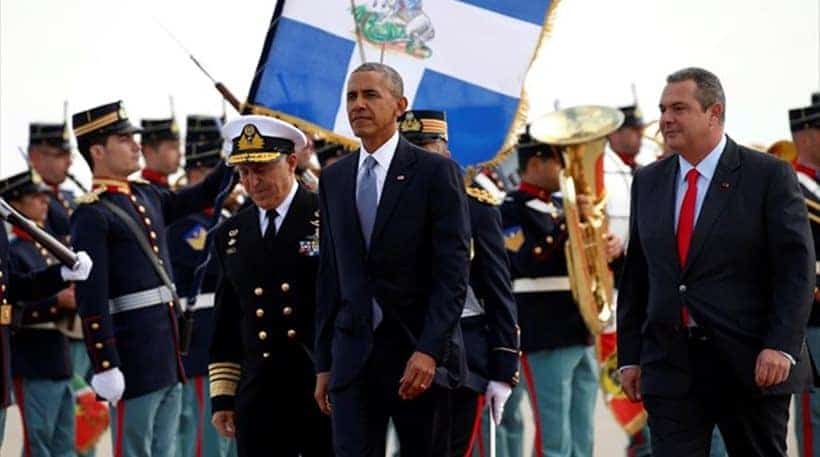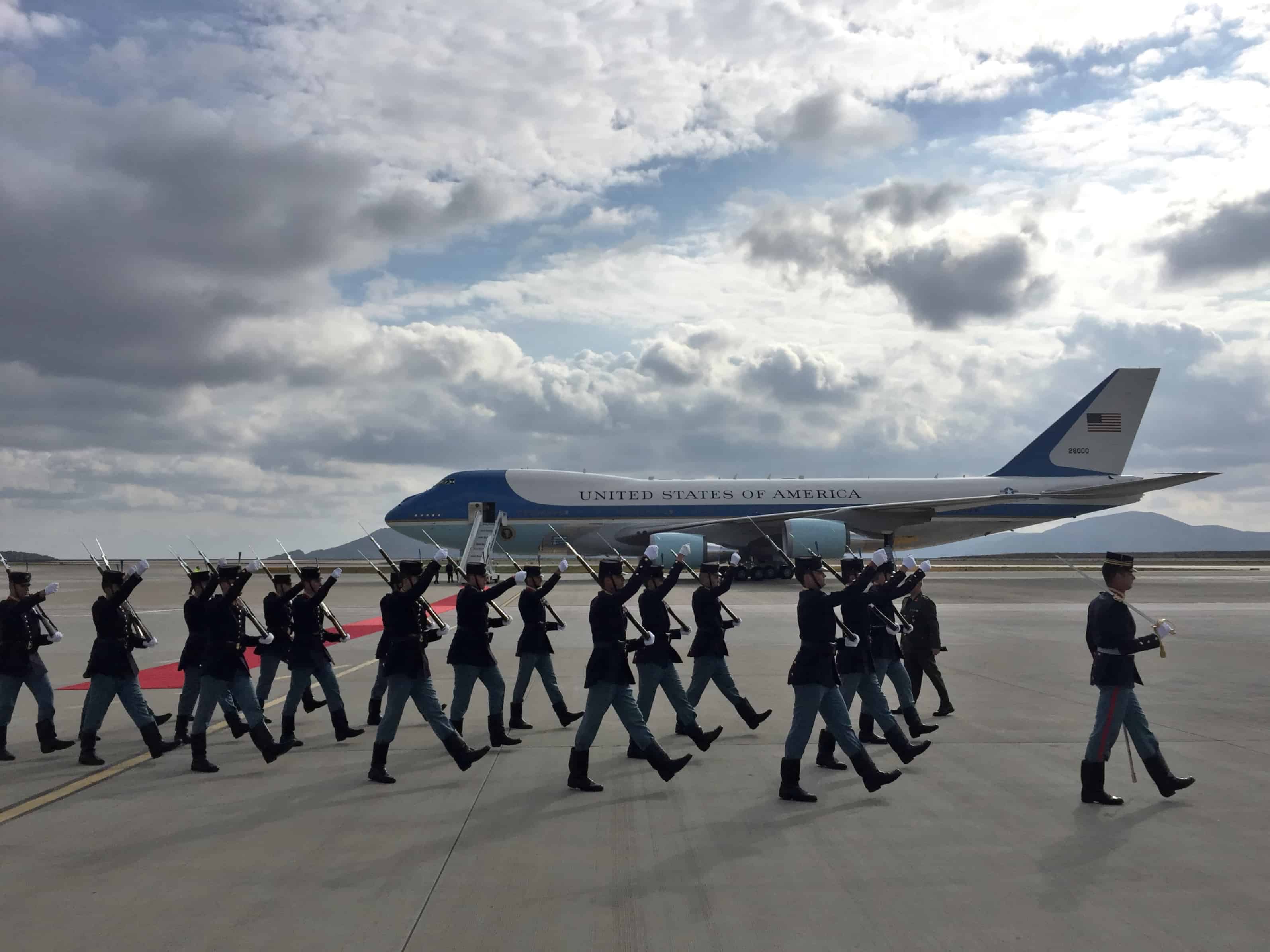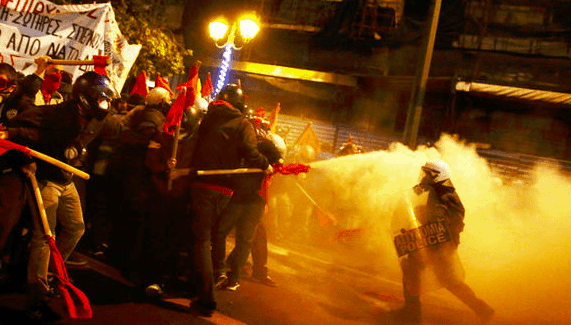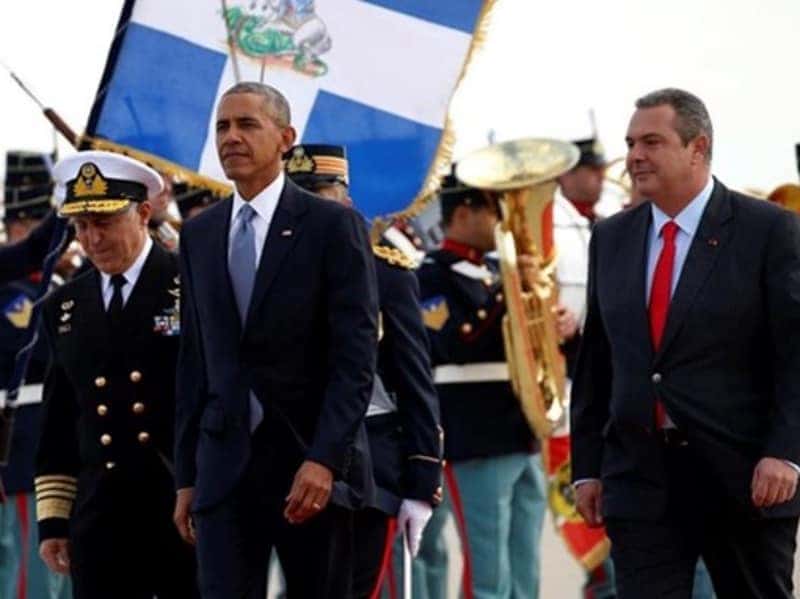By Aggelos Skordas

Barack Obama’s arrival in Athens yesterday at 10.40 am local time was received with mixed reactions. On one hand, the Greek SYRIZA-led government sees the presidential visit as an exceptional opportunity to gain his public support on a range of issues- including the country’s continuous efforts towards a debt reduction, as his next stop in what is seen as his last presidential trip to Europe, will be Berlin where he is planned to hold talks with Chancellor Angela Merkel. On the other hand, opposition parties described the visit as pointless, due to the upcoming end of his presidential term in two months as well as his replacement in the White House by Republican Donald Trump, who has made clear that his agenda regarding the Greek issue will be completely different from his predecessor’s.
The delegation that welcomed Barack Obama in cloudy Athens was headed by the Greek National Defence Minister and junior coalition partner ANEL leader, Panos Kammenos, who amongst others underlined that the outgoing US President’s visit to Greece constitutes a clear message that the debt-wracked country is on its way exiting the long-lasting financial crisis. The Greek official also expressed the people’s gratitude towards Obama “for assisting the country in difficult times”, while in an interview following his departure from Athens International Airport “Eleftherios Venizelos” he added that the US President was extremely affable and “happy to be in Greece, the birth place of democracy, in his words”.
Following his arrival in Athens, the US President, who was accompanied by the Treasury Secretary Jack Lew and National Security Advisor Susan Rice, headed to the coastal hotel he is staying at and at 1.30 pm was welcomed in the Greek Presidential Palace by the President of the Hellenic Republic, Prokopis Pavlopoulos. “Greece has gone through very challenging and dramatic times over the last several years. We are glad to see that progress is being made, although we recognise that there are significant challenges ahead, and we intend to stand shoulder to shoulder throughout this process”, Obama stressed commenting on Greece’s financial situation while he did not forget to congratulated the Greek people for the compassion they are showing during the on going refugee crisis.

Tsipras – Obama joint press conference
Almost an hour later, amid draconian security measures, Obama moved on foot towards the Maximos Mansion where he was received by the Greek Prime Minister Alexis Tsipras. The Greek crisis centred the two leaders discussion and the US President underlined that “I will continue to emphasise, to the rest of Europe, our view, that austerity alone cannot deliver prosperity”. After a meeting that lasted about one hour Obama and Tsipras held a joint press conference during which they made reference to critical issues of both internal and external issues, such as the financial crisis, the debt relief, the Greco-Turkish relations, the Cyprus problem, the refugee crisis, terrorism, energy policy, investments and regional stability.
Greeting the reporters with a Greek “kalispera” (good evening) the US President highlighted that Athens needs space if it is to recover from the recession and that austerity cannot be a “formula” for growth. He noted that Greece had had to endure some difficult measures but was on the right path, making its economy competitive again and attractive to investors. “The main lesson we learned was that especially when the economy is trying to recover, to create jobs and stimulate economic activity -this is the factor that reduces structural deficits and debts”, he pointed out. Obama also praised Greece for its financial commitment to NATO, as it is currently one of only five members of the alliance to have dedicated at least 2 percent of its GDP to defence spending. Regarding the long standing Cyprus issue and the island’s division (after the 1974 Turkish invasion), Obama said the prospects for a lasting and comprehensive settlement are “the best they have been for some time”, while peace talks are under way.
Although, he underlined that this does not necessarily mean “success is guaranteed”, even though the possibility of ending the conflict is visible. Answering questions, he characterised the US Congress as “hard to deal with”, but dealing with multiple parliaments and commissions -likewise the European Union member states are committed to do- is even more complicated, he said. "Many European leaders have inherited problems and are trying to identify how to resolve them in a time when a number of European Union countries are considering their very participation in the bloc," he argued. The US President also repeated his advice towards European governments to resolve banking problems as soon as possible in order to find other solutions that would bring development.
On his behalf, the Greek Prime Minister expressed the hope that US President’s last foreign trip brings about important results, namely in the Greek debt reconstruction as well as in a number of other issues. Commenting on the two countries’ financial performances since 2008, Tsipras said USA performed better than any European country in recent years and that is because of President Obama’s commitment to development-focused policies while European policy makers focused on austerity. Still, he highlighted, Greece is slowly decreasing unemployment and restoring confidence in its own economy.
At 7.30 pm the US leader attended an official dinner in his honour held by the Greek Presidency in the presence of both Pavlopoulos and Tsipras as well as a number of Ministers, main opposition New Democracy leader, Kyriakos Mitsotakis, former Presidents and Prime Ministers as well as Archbishop Ieronymos of Athens.

Clashes between demonstrators and riot police
It should be noted that despite the heavy police presence in downtown Athens, where some 4.500 officers were mobilised in order to guarantee the US President’s security, clashes broke out late in the afternoon. Demonstrators opposing Obama’s presence in Athens (two days ahead of the 1974 Athens Polytechnic Uprising anniversary) were gathered in three different locations intending to march towards the Greek Parliament and the American Embassy. The riot police squads blocked their way using tear gas and stun grenades, while some of the protesters threw Molotov petrol bombs and rocks against them. The tension was centred in the neighbourhood of Exarcheia where the protesters set up roadblocks, burned trash cans and attacked the local Police Station. Clashes lasted until early morning hours and police detained numerous demonstrators.
The fourth US President visit since 1959
Barack Obama’s visit to Athens marks only the fourth visit of a US President in Greece since 1959, when Dwight Eisenhower first visited the Greek capital, ten years after the Civil War ended, in his “peace and good will tour” that included stops in 11 countries. Thirty-two years later, in 1991, George Bush senior became the second US President to visit Athens, while only eight years later, in 1999, Bill Clinton became the last White House occupant to land in Athens with the presidential Air Force One.


